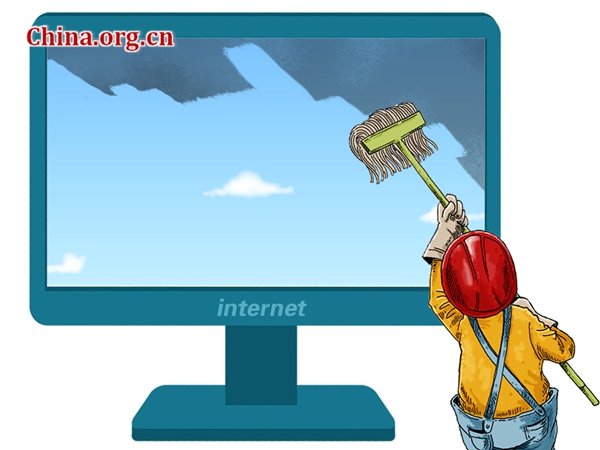Meaning of first rumor-fighting website in China
- By Chen Hua
 0 Comment(s)
0 Comment(s) Print
Print E-mail China.org.cn, September 20, 2016
E-mail China.org.cn, September 20, 2016
|
|
|
A spring-cleaning [By Zhai Haijun/China.org.cn] |
China saw the establishment of its first website specializing in exposing fallacious rumors in Beijing in August, 2013. In the following two years, 45 websites, newspaper and TV stations became partners, refuting more than one million items of rumors of various kinds.
Here are some cases showing how the website functions.
In April 2015, some media outlets reported strawberries produced in North China had excessive amounts of residue of a certain kind of herbicide, acetochlor, which causes cancer. These reports dampened the market, leading to heavy loss for farmers who insisted they did not use acetochlor in strawberry planting.
The rumor-fighting website worked with some professional testing agencies, experts, agricultural administrative departments and farmers to test the "cancer-causing" strawberries, and found none of over 200 samples showed any sign of the herbicide.
After that, the rumor disappeared gradually, according to the Beijing Internet Information Office. This case showed how the rumor-dousing website is playing an important role in raising people's awareness of verifying authenticity of any information they come across on the internet.
The Tianjin port blast in August 2015 was followed by many rumors, alleging that Beijing's environment was affected, and urging people to buy gas masks. Qianlong.com, a news portal in Beijing, the Beijing Environmental Protection Bureau and Beijing Meteorological Bureau quickly responded to public concerns, and published real-time air quality data for southeast Beijing, where the capital borders Tianjin. Monitoring showed Beijing's air quality had not been influenced by the accident. The rumors soon died out.
According to Sina.com, the operator of Weibo, a popular micro blog in China, it received many public reports of every rumor after the Tianjin blast, showing how important it was for public consciousness to be raised to fight rumors.
Under the support of the rumor-fighting website, Sougou.com, a Chinese online search engine, published a report on spam short message and phone scam in February 2015, to which the administrative authorities actively responded by launching a large-scale campaign nationwide to deal with the problem and tracking down the fraudsters.
The website also helps drug control. Baidu.com, the largest online search engine in China, together with the Beijing Internet Information Office and drug-control social organizations in the capital, published the top 10 questions raised by netizens regarding drug control from 2005 to 2014, which shows the changing trends of drug problems in China.
The rumor-fighting website published the report as well. Drug-control officials in Beijing appreciated the media organizations' contribution to the public cause.
Despite its fast development, media experts say the rumor-fighting website still needs to strengthen cooperation with relevant parties and take advantage of advanced big-data technology to douse rumors as soon as they surface, taking preemptive actions to prevent and control their spread.
The author is an associate researcher of Beijing Internet Information office
The article was translated by Jason Lee.
Opinion articles reflect the views of their authors, not necessarily those of China.org.cn.






